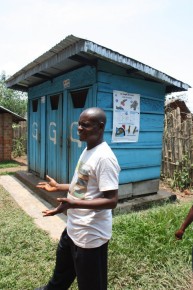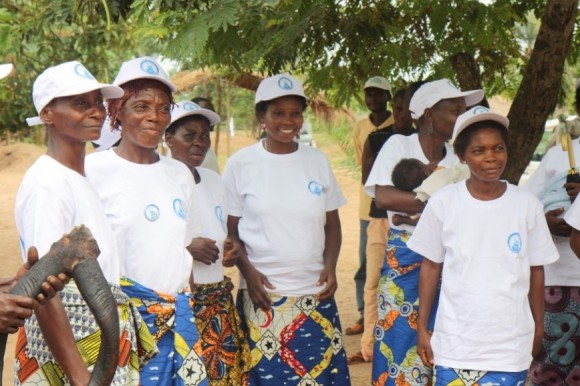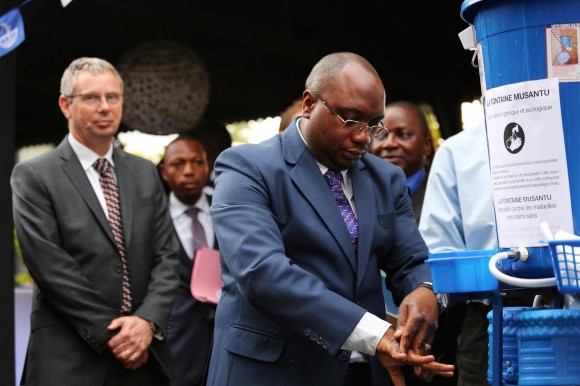Today is World Toilet Day. Worldwide, over 2.5 billion people do not have access to clean, functioning toilets – and over 1 billion people defecate in the open. More people have access to a cell phone than use a toilet.

Here in Kinshasa we are launching the second phase of the Healthy Villages and Schools programme with UNICEF and the government of the Democratic Republic of Congo (DRC). This programme both provides clean and safe latrines in villages and schools, and works on the social behaviour change that encourages people to use the latrines, and wash their hands afterwards, significantly reducing the spread of disease. This programme has produced some dramatic results, particularly in reducing the incidence of diarrhoea which causes 19% of deaths of under-5s in DRC.
I am also interested in the community-level political changes the programme has started to achieve. The programme can give a voice and role to individuals and groups that are usually overlooked – particularly the poor, and women and girls. It might seem like a strange place to look for changes in political power relations, to build elements of the social contract, and to seek to empower women and girls.
Traditionally, DFID has seen the health and nutrition results as sufficient justification for engagement in water, sanitation, and hygiene (WASH) interventions. The political change, governance and institutional reform aspects of such programmes are often not designed into the programmes, and then not looked for through monitoring and evaluation.

There is a debate in DFID DRC and in the broader development community as to whether it is possible (and indeed whether it is legitimate) for aid programmes designed to improve the health of communities to also have a "transformational" impact on local political relations. Some ask: where is the evidence of this broader political impact? For me, this is how change happens – not just in the Congo, but everywhere and at all points in history.
London. 1858. The year of "The Great Stink of London"( Halliday S., 2013, The Great Stink of London, The History Press). London’s Roman-era sewers were unable to cope with the massive increase in urban population resulting from the industrial revolution, nor with the advent of the flushing water closet. Tons of untreated sewerage was spilling out of inadequate cesspools, running through the streets and streams of the city, polluting the wells that were the main source of drinking water, and depositing into the Thames. The water of the Thames turned into a black slurry of purifying human excrement. The stench was so bad that the recently rebuilt Houses of Parliament had to be evacuated. More critically, the contamination of drinking water led to serious outbreaks of cholera that killed over 30,000 Londoners in 3 epidemics.

The hero of the day was Sir Joseph Bazalgette, who had the vision and engineering brilliance to construct hundreds of miles of brick-lined underground sewers and embankments (including The Embankment) that diverted the city’s waste safely away from the Thames. Wherever Bazalgette’s sewers were installed, deaths from cholera dropped to zero. But the engineering works, as revolutionary as they were, would not have been possible without the governance and institutional reforms that accompanied Bazalgette’s technical solution.
Changes to national and local government; the formation of new public bodies; and changes to the taxation system were all required – against massive resistance from vested interests – before Bazalgette’s vision could become reality. Bazalgette is credited with saving more lives than any other Victorian. Although less lauded, he has had a greater impact on the architecture of London than Sir Christopher Wren; was more innovative and creative in his use of engineering solutions than Isambard Kingdom Brunel; and more influential on epidemiology and public health than Florence Nightingale (who believed that disease was transmitted through smell, rather than carried by contaminated water). It could also be argued that he had a greater impact on the reform of Britain’s institutions and democracy than Disraeli or Gladstone – and through the introduction of taxation to pay for public services, laid the foundation for the welfare state.
So what is presented as a technical fix can often have unanticipated institutional impacts far beyond the scope of the original intervention. Our WASH programme, DFID's largest bilateral WASH programme globally, may be a crucial point of entry into broader debates about institutional and governance reform in the DRC. We shall see.


2 comments
Comment by Stephen Jones posted on
Chris, this is a fascinating blog post. I know there is still work ongoing on the evaluation of phase 1 of the Healthy Villages and Schools programme, but I wondered if there is already any more detailed documentation available on the sorts of local political changes you talk about? Many thanks, Stephen (WASH M+E Coordinator of DRC WASH Consortium)
Comment by Chris Pycroft posted on
Hi Stephen, thanks very much for your interest. We hope that the sustainability survey currently on-going as part of the Healthy Villages and Schools programme will provide more qualitative evidence on the changing dynamics at the local level between political and community representatives. This piece of research is due to report at the end of this year.